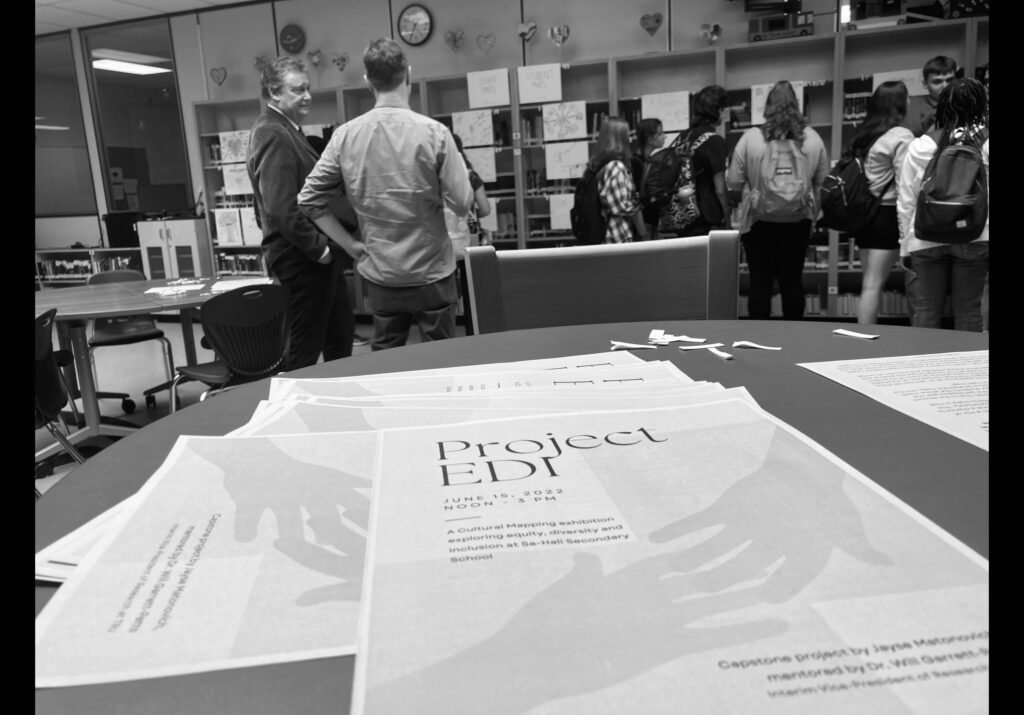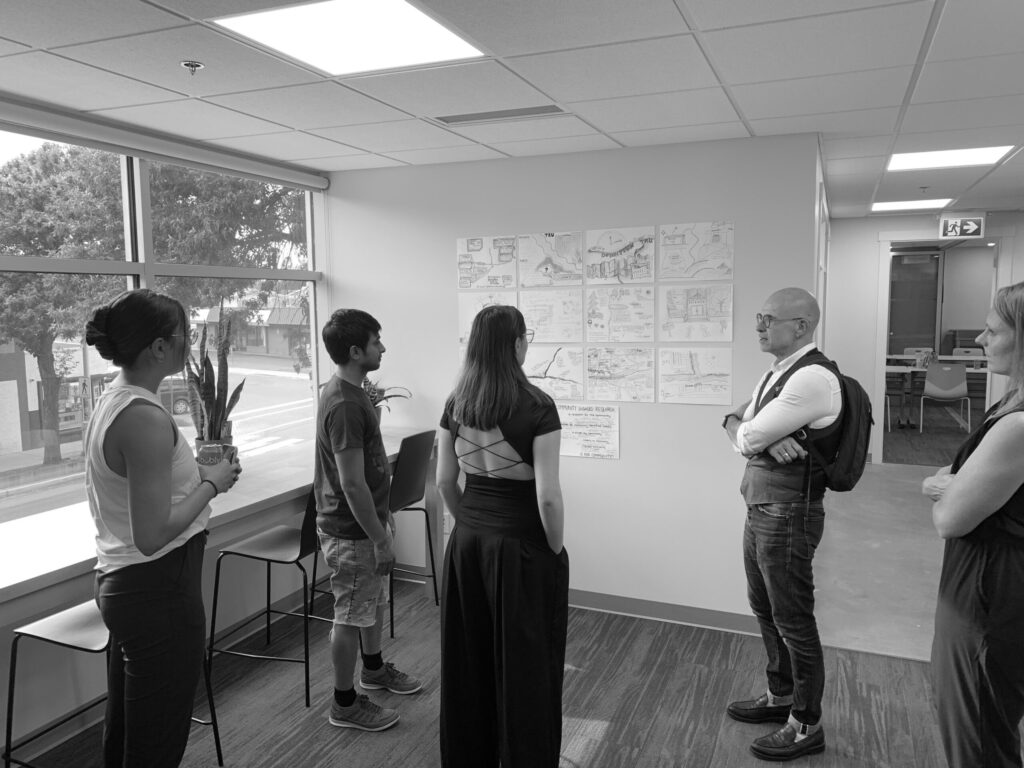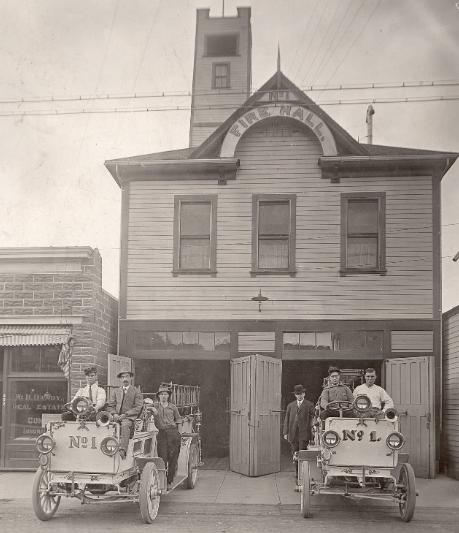Community & Cultural mapping
research group
Supported initially by a SSHRC Insight Grant and a Vancouver Foundation Grant, and building on the legacy of a recent three-year Mitacs Grant and two SSHRC Community-University Research Alliance grants, the Community & Cultural Mapping Research Group brings together an interdisciplinary community of interest and research practice.
Thompson Rivers University campuses are on the traditional lands of the Tk’emlúps te Secwépemc (Kamloops campus) and the T’exelc (Williams Lake campus) within Secwepemcúlucw, the traditional and unceded territory of the Secwépemc. The region TRU serves also extends into the territories of the St’át’imc, Nlaka’pamux, Nuxalk, Tŝilhqot’in, Dakelh, and Syilx Nations.
The research group seeks sustainable arts-informed research relationships that extend beyond the project
Our Projects
Our projects seek impactful social change in multiple fields
Researcher-in-Residence Initiative
The “Researcher-in-Residence Initiative in Cultural Mapping, Economic Development, Social Inclusion, and Urban Planning” works toward the integration of community-engaged research practices over a significant period of time and in a manner meaningful to the City’s cultural, economic development, and community planning and policy processes.
The Researcher-in-Residence (RiR) Initiative is built upon working partnerships previously established through two nationally-funded Community-University Research Alliance (CURA) grants, both focusing on mapping the culture of small cities. Two research MOUs, one with the United Way and one with the City of Kamloops, have extended these partnerships, with the University taking a lead role in highlighting social innovation and community-engaged research as priority areas.
Working together with these partners, and as a result of our recent scholarship, we were invited by the City of Kamloops (British Columbia, Canada) to further animate community-engaged research and cultural mapping methodologies as strategies for addressing social and cultural problems.
The You are Here Project, featured here, employs cultural mapping, gathering data for the Kamloops Cultural Strategic Plan.


Cultural Mapping
Lived & Living Experiences
“Cultural Mapping Lived/Living Experiences of the Toxic Drug Overdose Crisis in BC’s Small Cities” uses cultural mapping to focus on the toxic drug overdose crisis in our communities. The project is working with populations in Kamloops, Comox Valley, Campbell River, and other communities. The purpose is to use cultural mapping to better understand the crisis through the lens of those directly impacted. An effective response requires the development of shared community understanding and a belief that a coordinated implementation of good policies and actions can produce positive change.
Our current focus is on those working in the Trades: Trades training programs in both universities and schools do not typically include a focus on drugs as part of their curricula. Inclusion of such educational material, if drawn from the lived and living experience of those working in the trades, would likely have a profound impact on the next generation of trades workers
Mapping Equity, Diversity, and Inclusion
Project EDI involves students, validates their experiences and insights, moves beyond mere EDI compliance, and, when done well, helps build an inclusive community. Capturing the local EDI landscape visually, in writing, and in conversation with students, their teachers and administrators, cultural mapping presents an innovative and even necessary complement to existing EDI approaches. The mapping makes individual experiences visible and public, keeping them local and inclusive.
The Pride Project, also featured here, began with an invitation. The Director and Curator of the Salmon Arm Arts Council and Gallery wanted to extend the community’s Pride Week celebrations and exhibition by adding a research component. They wanted to know how cultural mapping might help provide evidence for progressive policy change—to create safer cultural spaces for the City’s LGBTQ2S+ Community.
The EmpowerHer Project (2018) involved two of our artist-researchers working in collaboration with the United Way to explore and document women’s perceptions and attachments to place. This arts-informed approach to cultural mapping engaged over 700 women, with the aim of recentring the voices, everyday knowledge, and authority of these women in relationship to place.


Student Research Journey Mapping
A New Cartography of Undergraduate Student Research Journey Mapping uses arts-informed cultural mapping techniques to make visible students’ lived experience of university research.
Building on the mental mapping work of Kevin Lynch (1960) we developed a schema for analyzing and interpreting what we identified as “undergraduate student research journey maps,” arguing that cultural mapping provides a readymade technique for understanding how students encounter and navigate university research cultures.
A Cultural Mapping of the FireSmart Program
“A Cultural Mapping of the FireSmart Program: Community and Social Drivers Affecting Both Neighborhood and Personal Awareness and Engagement in Kamloops, B.C., with Implications for Smaller Communities Generally.”
Being “fire smart” begins with becoming “fire aware.”
Starting this spring, and supported by a grant from the Wawanesa Insurance Wildfire Community Resilience Fund, TRU’s Community and Cultural Mapping Research Group will launch a unique fire awareness program co-designed and co-delivered by community and academic partners, including the Kamloops Museum and Archives, the Kamloops Art Gallery, United Way, and the City of Kamloops.

Our Research Focus
Explore our research focus, which encompasses mapping methodologies, interdisciplinary collaboration, public engagement, and capacity building initiatives.
Cultural Mapping
Innovate community connections.
Developing innovative tools for community and cultural engagement tailored to smaller communities’ needs.
Collaboration
Unite for research excellence.
Fostering interdisciplinary research projects through collaboration with community partners, academics, and students.
Engagement
Driving public involvement forward.
Building effective partnerships to encourage public involvement and knowledge exchange in cultural mapping endeavors.
Capacity
Take support to the next level.
Empowering student researchers and fostering high-impact learning experiences through mentorship and capacity enhancement initiatives.
Our Community Research Partners
Joining forces with organizations such as SSHRC, Vancouver Foundation, Mitacs, the City of Kamloops, United Way Centaide and Interior Health.






